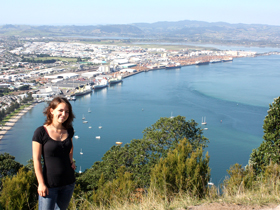Die Inhalte dieser Seite sind leider nicht auf Deutsch verfügbar.
Seitenpfad:
- INTERCOAST
- Latest News
- Archiv
- News 2011
- Environment Court Hearings On The Proposed Dredging Of The Port of Tauranga, New Zealand Were An Eye-Opener For INTERCOAST PhD Student Lisa Marquardt
Environment Court Hearings On The Proposed Dredging Of The Port of Tauranga, New Zealand Were An Eye-Opener For INTERCOAST PhD Student Lisa Marquardt
The timing of my research stay in New Zealand turned out to be very well chosen as it allowed me to attend hearings at the Environment Court regarding one of the core case studies of my research: the proposed dredging activities at the Port of Tauranga to deepen and widen its shipping channels in order to be able to cater for container vessels with draughts of up to 14.5 m.
Following the application by the Port in 2009, the Bay of Plenty Regional Council had granted consent for the dredging activities the following year. However, the local iwi (the local Maori people or tribes) lodged an appeal against the consent, thus placing the case into the hands of the Environment Court to consider it afresh. Environment Court hearings took place in Mount Maunganui in March and November of 2011.
Following the application by the Port in 2009, the Bay of Plenty Regional Council had granted consent for the dredging activities the following year. However, the local iwi (the local Maori people or tribes) lodged an appeal against the consent, thus placing the case into the hands of the Environment Court to consider it afresh. Environment Court hearings took place in Mount Maunganui in March and November of 2011.

Port of Tauranga and Mount Maunganui, location and focus of environment court hearings attended by Lisa Marquardt.
Sitting in at the Court hearings for a total of 13 days was a most valuable experience for me on a number of different levels. It helped me to quickly acquire a good overall understanding of the issues at hand as the main facts of the case were summed up and repeated in the statements of the different parties, and several expert presentations illustrated the complex scientific connections in an understandable way. During the adjournments, I was able to discuss any questions left open, as well as my research ideas, with knowledgeable people from all kinds of disciplines that attended the hearings, both as witnesses, as well as just out of interest. While this helped me to sharpen the conceptual approach to my work, it also had another convenient side effect: I am now able to put faces to the names mentioned in procedural documents and expert reports, which adds a welcome liveliness to my otherwise largely theoretical research.

Lisa Marquardt at The Bay of Plenty in New Zealand.
Still being a relative newbie to the field of law, I have to admit that I would have never imagined court hearings to be so exciting! I was fascinated by the cross-examinations and how the Court and the legal advocates, through asking their skilfully framed questions, caused the witnesses to sweat. I was intrigued by the confusion that small ambiguities or mistakes in the expert statements could cause. Last, but not least, I was struck by the mood of the meeting, which, besides its rational and formal approach to understanding the details of the case, also had a fairly emotional touch to it with the singing of traditional Maori songs and the telling of ancient cultural stories by the local iwi witnesses. In particular, the powerful hikoi (protests) of around 200 local iwi members standing in front of the Court building – with rolling eyes and stuck out tongues (typical gestures of intimidation in the Maori culture) accompanied by rhythmic shouting and feet stamping, a symbolic attack on the Court building as if it were a dredge monster itself – deeply impressed me.


